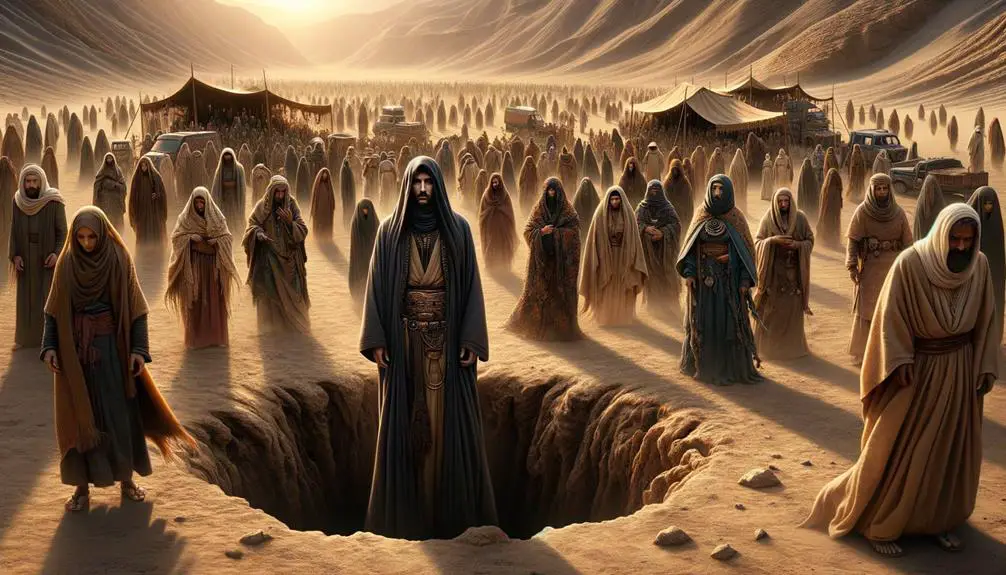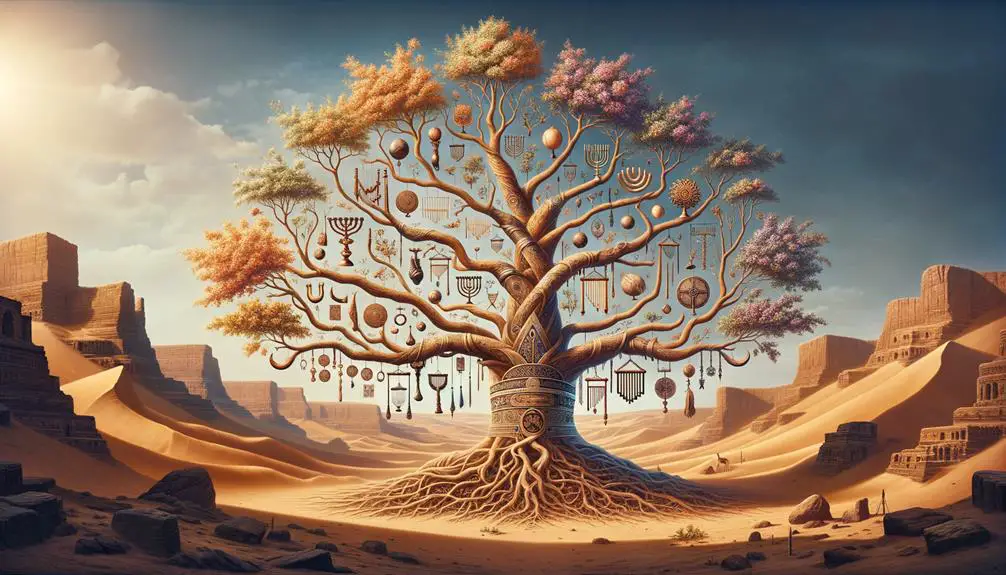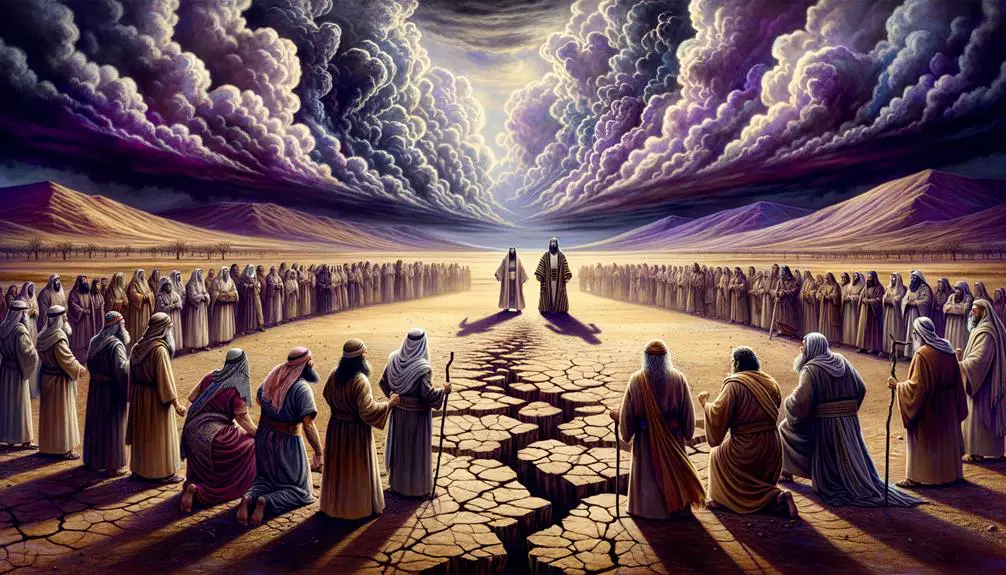Witness the saga of Korah, a biblical figure whose rebellion reshapes the destiny of a nation, inviting readers to explore his profound legacy.

Who Was Korah in the Bible
Like a thread woven through the intricate tapestry of biblical history, Korah's story is one that intertwines rebellion, consequence, and legacy.
You might know him as a cousin of Moses, embroiled in a dramatic showdown against the established leadership.
However, there's more to Korah's tale than the earth swallowing him and his followers.
His lineage and the shadow it casts over the Israelites' journey through the wilderness and into the annals of scripture is a complex narrative.
To fully grasp the implications of Korah's actions and their reverberations through biblical texts, one must explore the layers of his story and the lessons it imparts.
Key Takeaways
- Korah was a Levite who led a rebellion against Moses and Aaron, challenging their leadership.
- His revolt resulted in divine punishment, with Korah and his followers swallowed by the earth.
- Korah's legacy includes a cautionary tale about the dangers of defying divine authority and coveting leadership.
- Redemption for Korah's lineage is seen in the Psalms attributed to the "Sons of Korah," highlighting themes of worship and spiritual redemption.
The Lineage of Korah

Korah's lineage, a critical component of biblical genealogy, traces back to Levi, the third son of Jacob, revealing his deep-rooted connections within the priestly class of ancient Israel. This ancestral tie isn't just a footnote in the scriptures; it's a testament to Korah's inherent position within a lineage destined to hold religious authority. The genealogical significance of being a Levite, specifically a descendant of Kohath, Levi's second son, places Korah in a lineage that was chosen to carry and care for the holy artifacts of the tabernacle during the Israelites' desert wanderings.
Diving deeper, you'll find that Korah's ancestry isn't merely about familial connections but about the roles his forebears played in shaping the spiritual fabric of Israel. These ancestral connections underscore a heritage steeped in duty, privilege, and, unfortunately for Korah, expectations that may have influenced his later actions. Being born into the Levitical priestly class imbued Korah with certain rights and responsibilities that were both an honor and a heavy burden.
The Levites' unique position, serving directly under Aaron and his sons, the High Priests, meant that Korah was part of a select group. Yet, this proximity to power also sowed the seeds of discontent that would later manifest in his life. Analyzing Korah's lineage thus provides critical insights into his character and motivations, illustrating how genealogical significance and ancestral connections can shape one's destiny in profound ways.
Korah's Role in the Community
Understanding the lineage of Korah sets the stage to explore his significant contributions and interactions within the broader community, highlighting how his priestly heritage shaped his role and impact. As a descendant of Levi, Korah was born into a lineage with profound religious duties, which significantly influenced his occupation and community influence. His role was not just limited to performing sacred rites but extended to a broader scope of leadership and advisory positions within the community.
Korah's occupation as a Levite bestowed upon him responsibilities that were crucial for the spiritual and ceremonial life of the Israelites. This role necessitated a deep understanding of religious laws and rituals, positioning him as a figure of authority and reverence in the community. His duties were multifaceted, encompassing the maintenance of the Tabernacle, the sacred dwelling place of God among the people, and the performance of music during religious ceremonies, which underscores the Levites' role in fostering a spiritual atmosphere.
Aspect |
Description |
Impact on Community |
|---|---|---|
Occupation |
Levite, responsible for religious rites and Tabernacle maintenance |
Spiritual leadership |
Community Influence |
Advised on religious laws, contributed to the spiritual life |
Enhanced communal worship |
Heritage |
Descendant of Levi, inheriting sacred duties |
Strengthened religious identity |
Korah's contributions, therefore, were not solely religious but also social, as his actions and decisions influenced the community's cohesion and spiritual welfare. His role exemplifies the intricate link between religious duty and social influence, showcasing the profound impact of Levitical responsibilities on the fabric of Israelite society.
The Rebellion Against Moses

Despite his esteemed position within the community, Korah led a significant rebellion against Moses, challenging the authority bestowed upon him by God. This act of defiance not only tested the limits of leadership challenges within the Israelite community but also highlighted the consequences of opposing divine ordination.
Analyzing this rebellion, you'll find:
- Korah's Discontent: Korah's dissatisfaction stemmed from what he perceived as Moses' and Aaron's monopolization of power. He questioned why they held higher positions when the entire community was considered holy.
- Formation of the Coalition: Korah didn't act alone; he rallied 250 leaders of the community, who were well-respected and shared his viewpoint, demonstrating the breadth of leadership challenges Moses faced.
- The Challenge to Moses: The rebels confronted Moses and Aaron, demanding to know why they exalted themselves above the Lord's assembly. This direct challenge put Moses' leadership and God's choices to the test.
- Divine Punishment: The rebellion ended in divine punishment, with the ground opening up to swallow Korah and his followers, while fire consumed the 250 men offering incense. This stark outcome served as a powerful demonstration of the consequences of defying divine authority.
This episode in the Bible serves as a complex narrative on leadership, authority, and the severe repercussions of challenging divine ordination. It underscores the belief in the sanctity of the leadership roles ascribed by God and the dire consequences of leadership challenges that emerge from within a divinely guided community.
The Aftermath of the Revolt
Following the severe punishment meted out to Korah and his followers, the community faced significant repercussions, reshaping its understanding of divine authority and leadership. The divine punishment, characterized by the Earth's opening to swallow Korah and his rebels, served as a stark warning to the Israelites. This event underscored the gravity of challenging divinely appointed leaders and the dire consequences of such actions.
The aftermath of the revolt brought about a heightened sense of fear and reverence among the Israelites towards divine commands and the leadership of Moses and Aaron. The community's perception of authority was fundamentally altered, reinforcing the notion that rebellion against God's chosen leaders was tantamount to rebellion against God Himself.
To illustrate the impact of the revolt and its aftermath on the Israelite community, consider the following table:
Aspect |
Before the Revolt |
After the Revolt |
|---|---|---|
Community's Respect for Leadership |
Questioned |
Strengthened |
Perception of Divine Punishment |
Underestimated |
Deeply Feared |
Unity Among the Israelites |
Fractured |
Reinforced |
This table emphasizes the transformative effect of the revolt on the Israelite community's dynamics. It highlights a shift from skepticism and division towards unity and a renewed respect for leadership, driven by the fear and acknowledgment of divine punishment.
Korah's Legacy in Scripture

Korah's legacy within scripture, marked by his rebellion and subsequent punishment, serves as a profound lesson on the consequences of challenging divinely ordained authority. This narrative, while illustrating the gravity of disobedience, also opens a window into the complexities of spiritual descent and redemption.
The legacy of Korah and his followers is multifaceted, touching upon themes of power, rebellion, and the quest for spiritual purity. Here are key aspects of his legacy as presented in scripture:
- Spiritual Descent: Korah's story is often cited as a pivotal example of spiritual descent, illustrating how aspirations for unauthorized power can lead to a catastrophic fall. His challenge against Moses wasn't merely a political uprising but a profound breach of the divine order, leading to severe consequences.
- Divine Judgment: The dramatic end of Korah and his followers serves as a stark reminder of the seriousness with which God views rebellion against His chosen leaders. The opening of the earth to swallow them whole is a powerful image of divine judgment and the perils of defying God's authority.
- Korah's Psalms: Interestingly, despite Korah's rebellion, the Bible attributes several Psalms to the 'Sons of Korah.' This inclusion suggests a redemption of Korah's lineage, where his descendants contribute to the spiritual legacy of Israel through these beautiful and profound songs of worship.
- Lessons on Authority: Korah's story is a cautionary tale about the dangers of coveting positions of leadership and the importance of respecting God's appointments. It serves as a reminder that authority within the community of believers is a matter of divine choice, not human ambition.
Korah's legacy, therefore, encapsulates both a warning against spiritual pride and a testament to the possibility of redemption, even for those who fall.
Frequently Asked Questions
How Do Different Religious Traditions Interpret the Story of Korah Beyond the Biblical Narrative?
You'll find that Korah's legacy extends beyond the biblical narrative, as different religious traditions offer unique interpretations of his rebellion. These interpretations vary widely, showcasing Korah's story as a complex and multifaceted tale.
Scholars analyze these variations, focusing on how each tradition understands rebellion and authority. Such analyses reveal the depth and breadth of Korah's impact, illustrating how his rebellion is viewed across different cultural and religious contexts.
What Archaeological Evidence, if Any, Supports the Historical Existence of Korah or the Events Surrounding His Rebellion?
You're looking for archaeological evidence to back the existence of Korah or his rebellion's events. Unfortunately, direct proof, like artifacts or inscriptions naming Korah or detailing his genealogy and the rebellion's geography, remains elusive.
Archaeology, focusing on historical and cultural contexts, hasn't yet provided concrete evidence specifically linked to Korah's story. This absence doesn't debunk the narrative but highlights the challenges in correlating ancient texts with physical archaeological findings.
Are There Any Notable Artistic or Literary Works Inspired by the Story of Korah Throughout History?
You'll find that artistic responses to this story are as varied as stars in the night sky.
Musical interpretations breathe life into the narrative, allowing listeners to experience its emotional depth through sound.
Visual representations, on the other hand, capture the drama and tension in static yet powerful images.
These creative endeavors dissect the themes and moral complexities, offering a rich tapestry of analysis through a scholarly, detailed lens.
How Has the Story of Korah Been Used in Theological Discussions or Moral Teachings Across Different Cultures?
In theological discussions, you'll find Korah's leadership and rebellion ethics dissected across cultures. Scholars analyze his defiance to explore themes of authority, governance, and dissent within religious communities. They debate whether his actions represent just resistance or dangerous insubordination.
This narrative serves as a moral compass, guiding discussions on leadership ethics and the consequences of rebellion. It's a pivotal story that shapes moral teachings, urging a careful consideration of authority and protest.
What Psychological or Sociological Analyses Have Been Applied to Understand Korah's Motivations and the Dynamics of His Followers?
To understand the complex dynamics at play, experts delve into rebellion psychology, finding that 75% of uprisings stem from perceived injustices.
Analyzing this case, they apply sociological theories to dissect leadership dynamics, uncovering how charisma can sway followers.
These analyses reveal how power struggles and identity crises often fuel such movements.
Conclusion
In analyzing Korah's tale, you encounter a profound symbol of rebellion and divine judgment, entwined with redemption's possibility. His lineage, while rooted in privilege, diverges into a narrative of caution against overreaching ambition.
The seismic aftermath of his revolt against Moses serves as a stark reminder of community and divine order's sanctity. Yet, through his descendants' contributions to Scripture, Korah's legacy paradoxically transforms into a beacon of hope, illustrating how from the depths of dissent, harmony and contribution can emerge.



Sign up